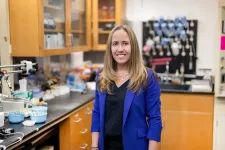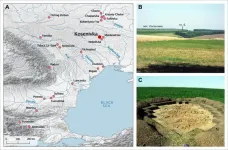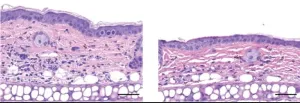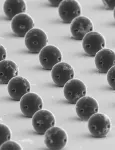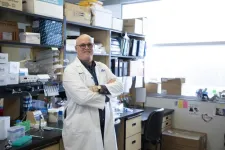(Press-News.org) The National Highway Traffic Safety Administration (NHTSA) estimates that in 2023 a staggering 40,990 people died from motor vehicle crashes in the United States, reflecting some of the highest numbers seen in nearly two decades.
The Herbert Wertheim School of Public Health and Human Longevity Science at University of California San Diego is creating programs to improve safety for all roadway users, including drivers, pedestrians and cyclists. With support from two grants from the California Office of Traffic Safety (OTS) through the NHTSA, the school is developing an educational program geared towards Native American youth as well as new online courses to improve older driver safety.
Youth Safety
Research indicates that Native American youth are at increased risk of dangerous driving behaviors including driving impaired, speeding, distracted driving and non-compliance with seat belt usage. A $320,000 OTS grant allows the Transportation Research and Education for Driving Safety (TREDS) Center at the Herbert Wertheim School of Public Health to develop an educational program that addresses these topics.
It is estimated that Native Americans and Alaska Natives have the highest traffic fatality rate compared to other racial and ethnic groups in the United States. Specifically, motor vehicle deaths among children and youth ages 0 to 19 years are up to eight times higher than those of other groups.
“The urgency to address these challenges stems from the alarming rates of motor vehicle crashes within the Native American youth community,” said Linda Hill, MD, MPH, distinguished professor at the Herbert Wertheim School of Public Health and TREDS director. “A tailored intervention is crucial to reduce the incidence of crashes and to empower a paradigm shift in driving behaviors, fostering a culture of responsibility and safety while honoring cultural traditions.”
TREDS initiated the “Steer Clear – Decide to Drive Sober” for teens in 2019, which has been taught across California by safety professionals in schools and communities; an online version of this program became available in 2023. The program emphasizes the risks and consequences of impaired driving among teens, as well as strategies to avoid this dangerous behavior.
Through partnership and collaboration with tribal communities, TREDS will adapt this program to Native American youth and expand the topics that are addressed. It will be disseminated by peer educators using a Train-the-Trainer model titled “Honoring Our Ancestors, Protecting Our Future: Traffic Safety for Native American Youth.”
“The ‘Train-the-Trainer’ model will enable community leaders, educators and influencers to deliver meaningful and effective road safety education within their communities,” said Hill. “Our TREDS Center on campus includes local Native representation, and we will incorporate historical knowledge of communities, utilize Native art for educational purposes and integrate cultural practices to teach healthy driving decisions.”
Online Safe Driver Training
In addition to the project for Native American youth, TREDS received a $387,000 grant to adapt two in-person courses to self-paced online formats.
TREDS developed “Drive Safer Drive Longer” in 2013, a course designed to refresh drivers’ knowledge of the rules of the road and promote safe driving among aging drivers. Since its creation, this course has reached more than 5,000 older drivers throughout California. It is projected that 1 in 5 drivers will be over the age of 65 by 2030. Driving is the primary mode of transportation used by the current adult population; for many, it has been decades since receiving driver education.
Emphasizing the dangers of impaired driving is also a priority for TREDS this year. “Higher Education – Driving High is DUI,” developed in 2019, addresses impairment due to cannabis and prescription medication. Driving Under the Influence (DUI) of any impairing substance is a major cause of vehicle crashes. While people mistakenly believe they are safe to drive after consuming a drug, their driving performance may still be impaired, which increases crash risk.
“Roadway safety can be improved through the delivery of education and intervention strategies that involve collaborative efforts among law enforcement, licensing agencies, healthcare providers, and the public to prevent and reduce harm due to impaired driving,” said Ryan Moran, MD, MPH, associate clinical professor at the UC San Diego School of Medicine and TREDS co-director. “We look forward to the work TREDS is doing to enhance roadway safety for all, specifically with priority populations like Native American youth and older drivers.”
TREDS offers additional traffic safety education and training programs to the public, including a new online class called “Just Drive – Take Action Against Distraction” that focuses on distracted driving prevention.
Additionally, TREDS provides courses, online training and educational materials designed to equip law enforcement, clinicians and other roadway safety professionals with the tools necessary to promote safe driving. These free resources address pedestrian safety, distracted driving prevention, refresher education for older drivers and impaired driving due to alcohol, cannabis and prescription medications.
The grant programs run through September 2025.
For more information about the program or to request a training, contact TREDS at 858-534-8386 or email treds@ucsd.edu.
END
Grants expand roadway safety programs to Native American youth and older drivers
2024-12-11
ELSE PRESS RELEASES FROM THIS DATE:
Database documents sex differences in cancer biology, risk, and treatment
2024-12-11
A groundbreaking new database could lead to vast improvements in precision oncology by documenting sex-based differences in cancer treatment efficacy, biomarkers, risk factors, and microbial influences across 71 cancer types. The database — created by researchers at the Yale School of Public Health (YSPH), Yale School of Medicine (YSM), and international collaborators — addresses a significant gap in current research and demonstrates how biological sex can comprehensively impact cancer onset, progression, and therapeutic outcomes, the researchers said.
The ...
University of Virginia's Silvia Blemker recognized by NAI for advancing muscle health through innovation
2024-12-11
Biomedical engineering professor Silvia Salinas Blemker, widely regarded as a leader in her field, has been elected as a Fellow of the National Academy of Inventors, recognizing her ability to turn research into tools that make a tangible difference. Her work zeroes in on muscle health, offering tools to help athletes bounce back, patients recover and researchers dive deeper into understanding muscle diseases.
At the core of Blemker’s contributions is her development of advanced techniques quantify and understand muscle using a combination of imaging and advanced modeling and data science techniques. For example, she ...
New study provides a picture of preconception health across three generations in the UK
2024-12-11
A new study details generational health trends among adolescents and young adults in the U.K. The study, published December 11, 2024 in the open-access journal PLOS ONE by Olivia Righton from King’s College London, U.K., and colleagues, has broad implications for reducing health disparities and designing targeted public health interventions.
Optimizing health in women and men before conception can improve pregnancy outcomes, reduce the risk of non-communicable diseases in both parents, and improve childhood health. Prior research has shown that many women ...
US veterans report average happiness levels of 5.41 out of 7, with greater happiness most associated with reporting greater purpose in life, lower depressive symptoms, and higher optimism, emotional s
2024-12-11
U.S. veterans report average happiness levels of 5.41 out of 7, with greater happiness most associated with reporting greater purpose in life, lower depressive symptoms, and higher optimism, emotional stability, and resilience
###
Article URL: https://journals.plos.org/plosone/article?id=10.1371/journal.pone.0313609
Article Title: Happiness in US military veterans: Results from a nationally representative study
Author Countries: U.S.
Funding: Preparation of this report was supported in part by the U.S. Department of Veterans Affairs 1IK1CX002532-01 (PJN). Funders did not play any role in the ...
Tattoo or not tattoo: Testing the limits of beauty in body art
2024-12-11
German survey respondents rated images of tattooed models as less beautiful than images of the same models with no tattoos, however younger people, tattoo artists and those with body art tolerated more ink, according to a study published in the open-access journal PLOS ONE on December 11, 2024 by Selina M. Weiler and colleagues from Helmut Schmidt University/University of the Federal Armed Forces Hamburg, Germany.
Tattoos are a millennia-old practice estimated to adorn up to one in four people in the world today. The 1950s saw a resurgence of this once-marginalized medium in Western culture, with widespread acceptance ...
New study reveals unique insights into the life and death of Stone Age individuals from modern-day Ukraine
2024-12-11
A research group led by Johannes Müller at the Institute of Prehistoric and Protohistoric Archaeology, at Kiel University, Germany, have shed light on the lives of people who lived over 5,600 years ago near Kosenivka, Ukraine. Published on December 11, 2024, in the open-access journal PLOS ONE, the researchers present the first detailed bioarchaeological analyses of human diets from this area and provide estimations on the causes of death of the individuals found at this site.
The people associated with the Neolithic Cucuteni-Trypilla culture lived across Eastern Europe from approximately 5500 to 2750 BCE. With up to 15,000 inhabitants, some of their mega-sites are ...
Feeling itchy? Study suggests novel way to treat inflammatory skin conditions
2024-12-11
A new approach to treat rosacea and other inflammatory skin conditions could be on the horizon, according to a University of Pittsburgh study published today in Science Translational Medicine.
The researchers found that a compound called SYM2081 inhibited inflammation-driving mast cells in mouse models and human skin samples, paving the way for new topical treatments to prevent itching, hives and other symptoms of skin conditions driven by mast cells.
“I’m really excited about the clinical possibilities of this research,” said senior author Daniel Kaplan, M.D., Ph.D., professor ...
Caltech creates minuscule robots for targeted drug delivery
2024-12-11
In the future, delivering therapeutic drugs exactly where they are needed within the body could be the task of miniature robots. Not little metal humanoid or even bio-mimicking robots; think instead of tiny bubble-like spheres.
Such robots would have a long and challenging list of requirements. For example, they would need to survive in bodily fluids, such as stomach acids, and be controllable, so they could be directed precisely to targeted sites. They also must release their medical cargo only when they reach their target, and then be absorbable by the body without causing harm.
Now, ...
Noninvasive imaging method can penetrate deeper into living tissue
2024-12-11
Metabolic imaging is a noninvasive method that enables clinicians and scientists to study living cells using laser light, which can help them assess disease progression and treatment responses.
But light scatters when it shines into biological tissue, limiting how deep it can penetrate and hampering the resolution of captured images.
Now, MIT researchers have developed a new technique that more than doubles the usual depth limit of metabolic imaging. Their method also boosts imaging speeds, yielding richer and more detailed images.
This new technique does not require tissue to be ...
Researchers discover zip code that allows proteins to hitch a ride around the body
2024-12-11
Researchers at The Ottawa Hospital and the University of Ottawa have discovered an 18-digit code that allows proteins to attach themselves to exosomes - tiny pinched-off pieces of cells that travel around the body and deliver biochemical signals. The discovery, published in Science Advances, has major implications for the burgeoning field of exosome therapy, which seeks to harness exosomes to deliver drugs for various diseases.
“Proteins are the body’s own home-made drugs, but they don’t necessarily travel well around the body,” said Dr. Michael Rudnicki, senior ...



